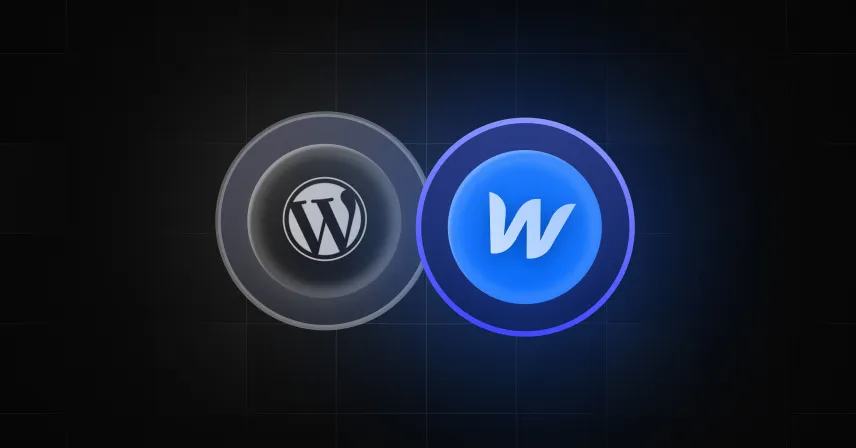Webflow vs Wordpress: Which Website Builder should you choose? (2025)


When it comes to making websites, you have lots of choices. Two popular options are Webflow and WordPress. So, which one should you pick in 2024? While both have cool features, only one is really focused on the future and can make a big difference to how successful your website is. Let's start by looking at the basics to figure out which one is the best fit for your website in the year ahead.
Webflow is a web development platform that allows you to create websites without any coding knowledge. It features an intuitive drag-and-drop interface and a variety of design templates to start with. However, this doesn’t mean you can't go further and implement your own code to make it unique and include features that other website builders do not offer, but more about that later. Let’s explore the key features first.
We’ve all heard of WordPress somehow, but basically, it’s an open-source content management system (CMS) widely used worldwide.
The choice between Webflow and WordPress can significantly impact your website's performance and success. Key considerations include:
We know that creating and designing your website is crucial for success. We all value attractive buttons and interfaces. Now, let's explore both platforms and their abilities:
Using pre-made templates or themes can significantly reduce development time. However, keep in mind that this means anybody could use the same template, which doesn't make you stand out uniquely.
A powerful CMS is crucial for uploading and managing website content efficiently.
The choice between Webflow and WordPress depends heavily on your personal comfort level and skills. For example, in Webflow, you can assign specific people to the editor so they can edit content with no more than two clicks.
Of course, website performance and speed are more important than ever ensuring a great user experience and search engine rankings (SERPs), meaning each builder should have the capacity to optimize for Googles Page Speed. Let's see how both perform in that context.
That means in Webflow, sitemaps and other features are created automatically, giving you full flexibility to optimize for speed and performance. In WordPress, you need to download external plugins to make changes. This also means you would have to manually update these plugins from time to time to ensure your website stays up to date with new requirements.
Here we have the same dilemma: Webflow allows you to make changes to meta titles, descriptions, optimize alt tags, and much more within the builder, while in WordPress, you would have to rely on external plugins. Not being biased here, but Webflow may have an advantage due to faster loading times and the built-in performance optimization features.
Selecting the correct hosting can greatly affect your website's performance as it depends on servers and other factors.
For a simpler context, this means that with Webflow, you don't have to do any research on which server is the best to host because everything goes through Webflow's services, which have a reputation for being super fast. In comparison with WordPress, you have the option to choose your own or a custom provider, which requires maintenance and extensive research.
It is also very important to have the ability to customize your website and have the flexibility in design and development to build out the features you want.
With Webflow, you have the opportunity to create unique and comprehensive design solutions that you can also export as code and host yourself. There are no limitations with Webflow. However, WordPress also has some good features on the code control side, allowing you to integrate nearly everything.
Cost is a significant factor in choosing between Webflow and WordPress, considering various pricing structures and associated costs.
This point really depends on your budget and long-term costs when choosing between Webflow and WordPress, as both platforms have different pricing models depending on your requirements.
Website security is paramount to prevent attacks, privacy breaches, and to comply with guidelines such as GDPR.
Here we can see the same thing again: both Webflow and WordPress protect your website from threats. Webflow does it automatically, while with WordPress, you would have to rely on third-party extensions.
After this thorough guide of Webflow and WordPress, you should have gained a better understanding of their specific strengths, weaknesses, and features, allowing you to consider your individual requirements, budget, and long-term goals when making a final choice.
Careful consideration of user-friendliness, customization options, hosting and maintenance, e-commerce features, SEO, and scalability will help you make an informed decision. Additionally, support, community, and available knowledge are crucial factors for both platforms.
Regardless of your choice, continuously improving and evolving your website is essential. This includes regular content updates, effective SEO strategies, and utilizing marketing tools to strengthen your online presence and achieve your goals. So, make sure the platform you are choosing offers accessible and easy content management.
But always remember that building a website is not just about creating an online presence; it's about crafting a digital experience that resonates with your audience and achieves your objectives. Whether you choose Webflow or WordPress, remember that the success of your website ultimately depends on the value it provides to your users and how well it serves your goals.
Now, it's up to you to make the right choice and execute.
P.S If you need help building your next website on Webflow, contact our team.